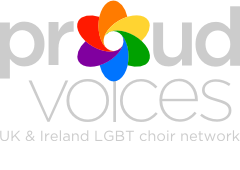
Hand in Hand Cardiff 2019
Thomas
Thomas R. Hilder is a writer, teacher, researcher, musician, and activist. Currently, he is researching LGBT music ensembles in London, Rome, and Warsaw, where he traces the emergence of these musical scenes, the globalisation of LGBT subjectivities, transnational networks, and notions of queer European citizenship. He lives in Trondheim where he is chair of the local queer choir, Kor Hen, and works as Associate Professor in Ethnomusicology at the Norwegian University of Science and Technology (NTNU).
From 16th to 18th August, LGBT+ choirs from across the UK and Ireland congregated in Cardiff for the 2019 edition of Hand in Hand. The biennial event offers a forum for LGBT+ choirs from England, Wales, Scotland and Ireland to participate in three days of concerts, workshops, social events, and public interventions. Hand in Hand first took place in 2013 in London as part of the 30th anniversary celebrations of the region’s oldest choir, the Pink Singers. Inspired by corresponding events, such as the European wide Various Voices festival, Hand in Hand was instigated by Proud Voices UK and Ireland in order to network the increasing number of LGBT+ choirs in the region, today totalling 51 choirs.
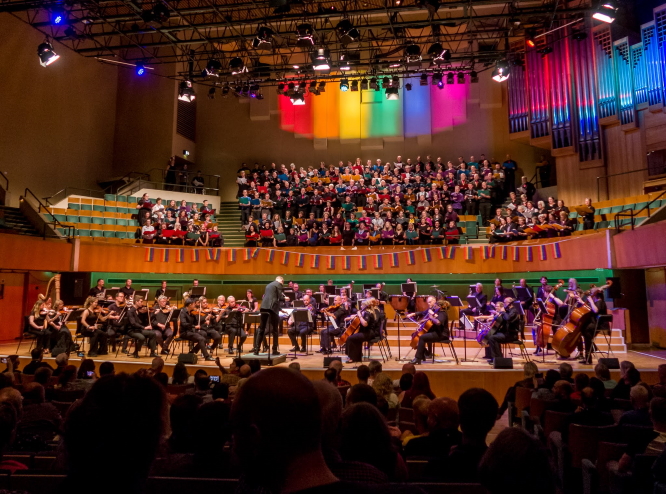
Now in its fourth edition, Hand in Hand 2019 showcased 29 of the Proud Voices choirs, and provided a platform for launching a new UK and Ireland LGBT+ Symphony Orchestra on the weekend before Cardiff’s 20th Pride event, Pride Cymru. The size and reach of today’s continually expanding LGBT+ choral network on display in Cardiff highlighted the significance of the cultural form of the community choir for contemporary British and Irish society. Over the course of three days, participants in the festival had a chance to sing and celebrate LGBT+ music, to socialise with their queer siblings, and to reflect on LGBT+ histories and activism.
Just two years ago the festival took place in Manchester and marked, alongside a whole array of UK national events, the 50th anniversary of the partial decriminalization of male homosexuality in the UK. Considering how the region has changed significantly over the last half a decade – referenda legalising same sex marriage and abortion in Ireland, an increase in hate crimes in the UK, dare we mention Brexit? – I wondered, as a spectator/participant, researcher and activist, what stories queer voices at Hand in Hand Cardiff would tell us in 2019.
Festival of Voice
In many ways Hand in Hand Cardiff is part of a larger international landscape of cultural festivals. One of the primary aims of the festival was to allow participating choirs to showcase themselves through four sessions of two parallel concerts on the Saturday, at the Cornerstone (a former church, now performance centre) and St David’s Hall, the main music concert venue in central Cardiff. While most audience members at these concerts were from other participating choirs, performances on Sunday at Cardiff Bay – including the Wales Millennium Centre, the Norwegian Church Arts Centre, and the Senedd, the Welsh National Assembly – reached out to a wider unsuspecting public, thus raising LGBT+ visibility in the Welsh capital.
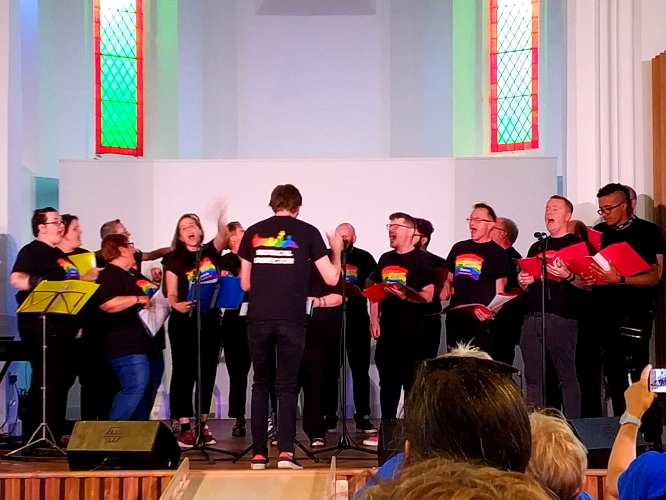
The festival was also fundamentally social and participatory. An opening party on Friday evening at the University of Cardiff Student Union enabled choir members to gather, reunite with old friends, and meet new members of the LGBT+ choir network. Here, members could be celebrated for their long-term commitment to the LGBT+ choir scene, through the presentation of the Brian Kennedy awards. Also available for participants were a range of vocal workshops on Saturday morning, including one addressing the particular needs of trans singers.
The pinnacle of the festival was the Saturday evening Gala Concert featuring performances by the three host choirs, orchestra, and festival chorus, consisting of members of all participating choirs. Reaching moments of camp spectacle that reminded me ever so slightly of the Last Night of the Proms, the concert ended with a singalong of the 1980s hit song “Total Eclipse of the Heart”, by the internationally famous welsh pop star Bonnie Tyler. Through in-reach and outreach work, politicisation of culture, and blurring the distinction between participants and audiences, Hand in Hand Cardiff 2019 drew on a wider global repertory of cultural festivals, while at the same time queering this global form.
Power of Voice
Emphatically affirmed at Hand in Hand Cardiff was the power of the voice. It is this power that is wonderfully evoked by Julia Balén in her recent book “A Queerly Joyful Noise: Choral Musicking for Social Justice” (2017), which offers a beautiful historical and ethnographic account of the queer choral movement. Exploring a broad range of dimensions of LGBT+ choral singing – identity, safe spaces, family, protest, queering conventions and institutions – Balén posits communal singing as a unique form of queer healing, empowerment, and “counterstorying”.
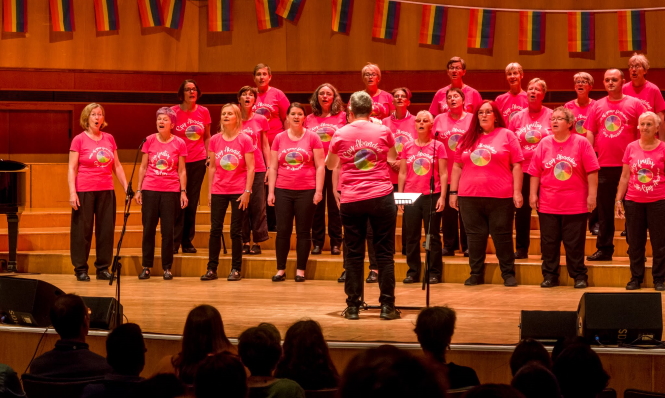
The joy of singing was evident in the different performances, from the impassioned vocals of Northern Proud Voices, the crisp harmonies of the Barberfellas to the poised incantations of The Sunday Boys. Throughout my own work as a researcher and LGBT+ choir singer, colleagues and friends have often revealed to me how communal singing is a particularly special hobby. Consistent with Balén’s observations, it involves using one’s whole body, listening to fellow members, and projecting to diverse audiences, as well as having many therapeutic benefits. The power of singing was encapsulated in many of the participating choirs’ names at the festival – Sing Out Bristol, Out Aloud, Resound Male Voices, to name a few, and not least the name of the festival’s overarching organisation, Proud Voices.
Vocal performance at the same time summoned and remoulded queer aesthetic sensibilities and political aspirations. Choirs highlighted their vocal suppleness through employing a broad range of repertoire, including a Spice Girls medley, Tchaikovsky choral pieces, a Welsh shanty, Eurovision hits, and newly commissioned works. And voices were embellished through experimentations in choreography, both formal and extravagant costumes, as well as innovative performance practices. As many LGBT+ voices continue to be marginalised in wider society, the sense of empowerment of having a voice in a choir cannot be underestimated. LGBT+ choral performances at Hand in Hand Cardiff were, I believe, in no insignificant way about articulating queer citizenship and agency
Multiplicity of Voices
Hailing from Bristol to Newcastle, Dublin to Sheffield, and Belfast to London, participating choirs at Hand in Hand Cardiff could share their differing experiences to their LGBT+ siblings in different parts of the region by drawing on local, national, and global stories and cultural heritage. The South Wales Gay Men’s Chorus highlighted their participation in a longer tradition of male choral singing in Wales by performing “Gwahoddiad”, a Welsh hymn with origins in the US. Each choir moulded the global phenomenon of choral singing to suit their own aesthetic and political needs, thereby transforming the model of the community choir.
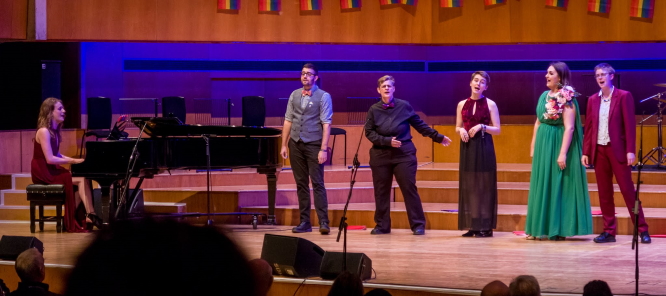
Hand in Hand Cardiff appeared committed to working toward greater forms of inclusivity within the LGBT+ community, specifically challenging persisting transphobia and ableism. The Cardiff Trans Singers, one of the host choirs, featured prominently on the programme and their performances achieved great applause. One of their singers, Sam Hickman, acted as compere for the concerts. Her compere colleague was Paul Davies, recent winner of the Mr Gay Wales and eventually Mr Gay Universe competitions, who has been celebrated for being the first physically disabled winner of these competitions.
The performance I found most striking was by Sheffield’s choir Out Aloud. It featured one song in which two of its members stood at the front of the stage and read out names of LGBT+ activists, which anchored the festival in a longer history of LGBT+ struggles. Between two of their songs, one choir member held an impassioned speech addressing the recent dispute about the introduction of LGBT issues and sex education at a school in Birmingham. They reminded us of continual Islamophobia within the LGBT+ community and critiqued the ways in which national media have attempted to pit Muslim and LGBT+ communities against each other.
Vocalising Solidarities
Meanwhile, the European Queer Choir offered commentary on Brexit by singing Heidi Brühl’s not-to-be Eurovision song from 1960 “Wir werden niemals auseinandergehen” (We will never part). This choir was originally planned as a one-off project by European delegates at the 2016 North America LGBT+ chorus festival GALA in Denver. Since the UK 2016 referendum, however, the members of the project acknowledged its potential wider symbolic importance and decided to continue its efforts by setting up rehearsals in a European city every couple of months. As one of the members commented between songs, “Whatever happens, European queers will stick together”, thereby intoning the vision of unity encapsulated in the festival’s very name, Hand in Hand.
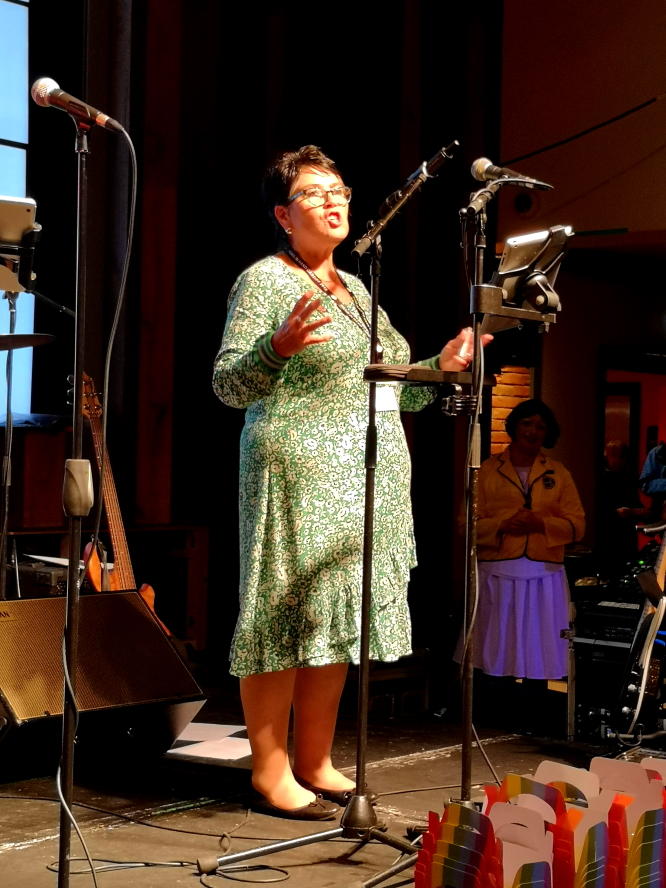
This message of solidarity was made explicit in the festival’s opening party with a speech by the former Labour Party MP Sian James. James, from South Wales, had played an important role in the miners’ strike and its remarkable collaboration with LGBT+ activists from London in 1984 – depicted in the award-winning film Pride – and was keen to remind festival participants of how both communities had been victims of Thatcher’s conservative administration in the 1980s. As James wrote in the festival programme, “[t]ogether we will continue the legacy of our original decision to support each other, create new friendships and further break down the barriers of prejudice and misinformation about LGBTQ+ communities”.
Also at the opening ceremony, Hsien Chew – founder of Proud Voices, singer in the Barberfellas and the Pink Singers, and a key activist in the transnational LGBT+ music scene – was keen to encourage activism and contemplation. He celebrated the growing strength and diversity of the UK and Irish LGBT+ choir scene. At the same time, he reminded participants of perpetual struggles within the LGBT+ community – referring specifically to the participation of “terfs” (trans-exclusionary radical feminists) in the 2018 London Pride parade – and also the increase in transphobic and homophobic as well as racist and xenophobic hate crimes in Brexit Britain. Such commentary made me reflect on the enduring relevance of LGBT+ community choirs but also the hard work ahead.
Voicing Queer Futures
Hand in Hand Cardiff offered a chance for queer choirs in the UK and Ireland to sing and share songs, songs which acquired new meanings through the local stories individual choirs recounted. There were songs about discrimination and of pride, and songs which expressed defiance and joy. Singing nurtured well-being, network-building and new forms of political solidarities. Participating choirs highlighted their significance for building local LGBT+ communities in towns and cities where other public LGBT+ institutions continue to vanish. Offering a potential refuge beyond a trans-, bi- and homophobic wider society, each choir offered a model of care and healing for local LGBT+ people, especially those of us living with (visible or invisible) physical and/or mental health issues.
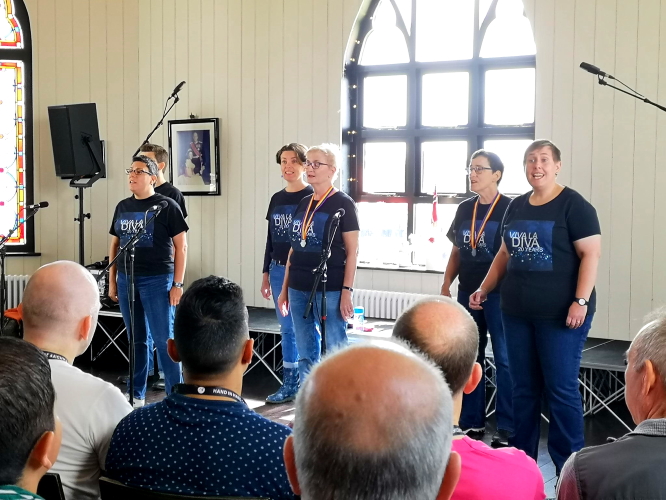
I was excited to see how the festival itself staged a public intervention and supported LGBT+ rights in the Welsh capital. Open to members of the public, it invited people from wider society to show queer solidarity. At the same time, it bore opportunities to address internal LGBT+ hierarchies and nurture a greater commitment to safer spaces for all.
While 2017 offered a moment for the British nation to celebrate apparent UK exceptionalism and its status as a beacon for LGBT+ rights internationally, Hand in Hand Cardiff questioned our faith in notions of linear progress for the whole region. Indeed, the festival reminded us of the continued challenges of LGBT+ people while offering us a space of necessary escapism from those very challenges. At the closing ceremony, the choir Northern Voices, from Newcastle, introduced themselves as the hosts for the next edition of Hand in Hand in 2021. It is up to them and the rest of the Proud Voices network to realise the potential of the singing voice to bring about the kinds of alternative queer futures of which we dream.
References and Further Reading
- Attinello, Paul. 2006 [1994]. "Authority and Freedom: Toward a Sociology of the Gay Chorus." In Queering the Pitch: The New Gay and Lesbian Musicology, edited by Philip Brett, Gary C. Thomas and Elizabeth Wood, 315-346. New York & London: Routledge.
- Balén, Julia. 2017. A Queerly Joyful Noise: Choral Musicking for Social Justice: Rutgers University Press.
- Giorgi, Liana, Monica Sassatelli, and Gerard Delanty, eds. 2011. Festivals and the Cultural Public Sphere. London: Routledge.
- Gordon, Eric A. 1990. "GALA: The Lesbian and Gay Community of Song." The Choral Journal 30 (9).
- Hilliard, Russell E. 2008. "A Social and Historical Perspective of the San Francisco Gay Men’s Chorus." Journal of Homosexuality 54 (4):345-361.
- MacLachlan, Heather. 2015. "Sincerity and Irony in the “Gay” Music of GALA Choruses." The Journal of American Culture 38 (2):85-101.
- Miyake, Esperanza. 2013. "Understanding Music and Sexuality through Ethnography: Dialogues between Queer Studies and Music." Transposition 2013 (3):1-20.
- Strachan, Jill. 2006. "The Voice Empowered: Harmonic Convergence of Music and Politics in the GLTB Choral Movement." In Chorus and Community, edited by Karen Ahlquist, 248-261. Urbana: University of Illinois Press.


